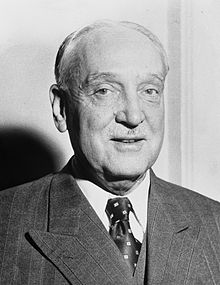Adolf Schärf
| Adolf Schärf | |
|---|---|
 |
|
| 6th President of Austria | |
|
In office 22 May 1957 – 28 February 1965 |
|
| Chancellor |
Julius Raab Alfons Gorbach Josef Klaus |
| Preceded by | Theodor Körner |
| Succeeded by | Franz Jonas |
| Vice-Chancellor of Austria | |
|
In office 20 December 1945 – 22 May 1957 |
|
| Chancellor |
Leopold Figl Julius Raab |
| Preceded by | vacant Austria annexed by Nazi Germany last title holder: Edmund Glaise-Horstenau (–1938) |
| Succeeded by | Bruno Pittermann |
| Personal details | |
| Born |
20 April 1890 Nikolsburg, Moravia Austria-Hungary |
| Died | 28 February 1965 (aged 74) Vienna, Austria |
| Nationality | Austrian |
| Political party | Social Democratic Party of Austria |
| Spouse(s) | Hilda Schärf (1886–1956) |
| Religion | lapsed Catholic |
![]() Adolf Schärf (20 April 1890 – 28 February 1965) was an Austrian politician of the Social Democratic Party (SPÖ). He served as Vice-Chancellor from 1945 to 1957 and as President of Austria from 1957 until his death.
Adolf Schärf (20 April 1890 – 28 February 1965) was an Austrian politician of the Social Democratic Party (SPÖ). He served as Vice-Chancellor from 1945 to 1957 and as President of Austria from 1957 until his death.
Schärf was born in Nikolsburg, Moravia (present-day Mikulov, Czech Republic), into a poor working-class family. Living in the Austro-Hungarian capital Vienna from 1899, he attended the gymnasium in Hernals and went on to study at the University of Vienna. The talented young man put himself through law school working part-time and with a scholarship granted for academic excellence. He received a doctorate in summer 1914 and, upon the outbreak of World War I four weeks later, volunteered for service in the Austro-Hungarian Army.
At the end of the Great War, Schärf was discharged as a Second Lieutenant. Having witnessed the defeat and dissolution of the Austro-Hungarian monarchy, he entered politics and, through the mediation of the deputy Otto Glöckel, found employment as the secretary of the Social Democratic president of the National Council parliament Karl Seitz. He held the post as a secretary throughout the years of the First Austrian Republic until the resignation Parliament President Karl Renner in March 1933. Schärf, as well as Karl Seitz and the Austromarxist party official Otto Bauer, had urged Renner to step down from office, which proved to be fatal as it gave the government of Chancellor Engelbert Dollfuss the opportunity to overthrow the parliamentary system.
...
Wikipedia
